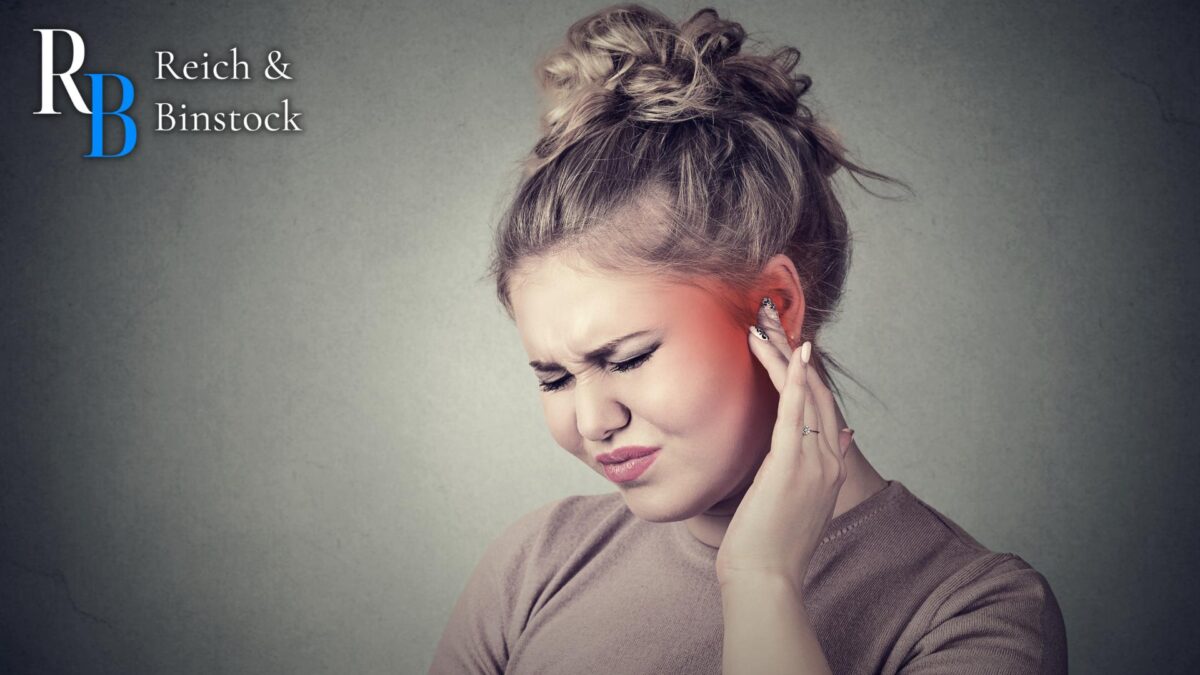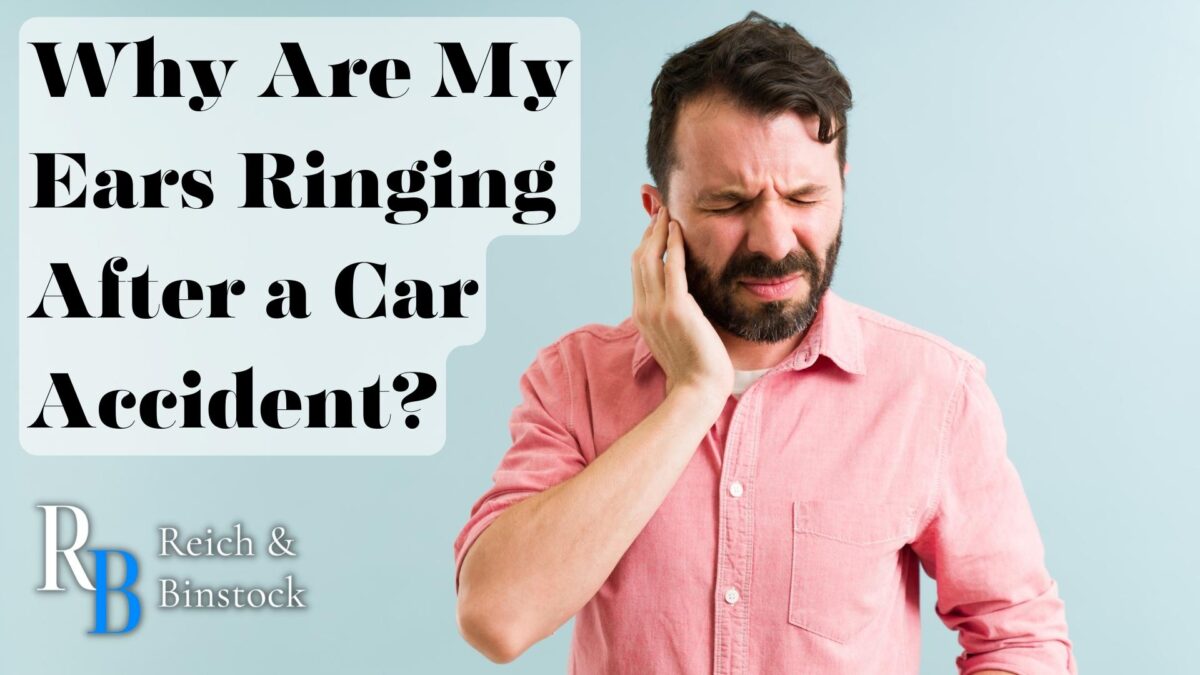Car accidents can result in a number of different injuries that can be both physical and internal. Just because you may not have outward signs of an injury doesn’t mean you’re unscathed. Following a traumatic event like a car accident, the head and body can be internally damaged without us realizing it. A common car accident injury many people may write off is tinnitus or ringing in the ears.
Many people experience ringing in the ears after a car accident caused by head trauma or a neck injury, but the annoying noise can often resolve itself. But why exactly are your ears ringing after your accident? The Houston car accident attorneys can answer that question, as well as what exactly tinnitus is, what causes it, and more.
If you were injured in a car accident that resulted in hearing loss, ear pain, or tinnitus, you can file a personal injury lawsuit to recover damages. Hearing loss and other hearing problems can affect people for months or even years, impacting their jobs and daily lives. No matter the extent of your car accident injuries, you deserve compensation.
To schedule a free consultation with one of our experienced personal injury attorneys at Reich & Binstock, call 713-622-7271 today.
What Is Ear Ringing (Tinnitus)?
Tinnitus is the medical term for ringing in the ears. Other sounds that people suffering from tinnitus can hear are buzzing, clicking, hissing, humming, and roaring. Regardless of the type of phantom sound that someone hears, it can either be so minor that a person barely hears it or so loud that it disrupts their day-to-day life.
Everyone can be affected by tinnitus differently and experience varying symptoms. Common tinnitus symptoms are fatigue, stress, insomnia, headaches, problems balancing, depression, trouble concentrating, and vertigo.
Types of Tinnitus

Tinnitus can be caused by an injury, inner ear dysfunction, age, or noise-related hearing loss. Depending on the cause of tinnitus, a person may experience symptoms for days, weeks, months, or years. There are four different types of tinnitus:
- Subjective Tinnitus: This type of tinnitus is most common and often results from exposure to loud noises like music at a nightclub, concert, or working at a construction site. Those suffering from subjective tinnitus can experience phantom noises that last several hours to several months. Prolonged symptoms of subjective tinnitus should be taken seriously. If the ringing in the ears persists, it’s recommended to seek medical attention.
- Objective Tinnitus: This version of tinnitus is very uncommon. It’s often caused by high blood pressure or involuntary muscle contractions. Unlike other types of tinnitus, objective tinnitus can be heard by others using a stethoscope. Since it can be detected, doctors often diagnose objective tinnitus during an ear exam.
- Neurological Tinnitus is often related to an underlying condition affecting the brain. Meniere’s disease can result in neurological tinnitus. This medical condition affects the middle ear and can cause symptoms like nausea, dizziness, ringing in the ears, vomiting, and light-headedness.
- Somatic Tinnitus: This type is usually associated with movements and touch. Those suffering from somatic tinnitus may be triggered by muscle spasms or mechanical issues affecting the head and neck. Somatic tinnitus can be caused by impacted wisdom teeth, car accidents, inflammation, tooth extraction, poor posture, and head and neck injuries.
Tinnitus in One or Both Ears
People suffering from tinnitus will often experience phantom sounds in both ears. When tinnitus affects both ears, it’s known as bilateral tinnitus. If the sounds are only heard in one ear, it’s unilateral tinnitus.
How Common Is Tinnitus?
Tinnitus is a common side effect many experience following a loud concert or other loud noises. However, Yale Medicine states that an estimated 20 million people are living with chronic tinnitus, with 2 million suffering from extreme cases.
This medical condition commonly affects construction workers, musicians, factory workers, first responders, and more. Anyone exposed to loud noises over long periods without hearing protection can be at risk for developing tinnitus.
What Can Cause Tinnitus After Car Accidents?

Many different medical conditions can lead to tinnitus. Some general health conditions that can cause tinnitus are blood vessel disorders, ear infections, hearing loss, and loud noises.
However, a person doesn’t have to be afflicted with a medical condition to develop ringing in the ears. Tinnitus can often be a side effect following a car accident. The physical trauma and noise related to the car crash can result in one or both ears experiencing tinnitus after a car accident. Head trauma, like a traumatic brain injury, and neck injuries, like a whiplash injury, can cause ear ringing, ear pain, and hearing loss.
Is Tinnitus a Permanent Injury?
A person can either experience tinnitus briefly or live with ringing in their ears permanently, depending on what caused the ear injury. Many people who have tinnitus will notice the phantom sounds fading over the course of several days. However, if a person suffers a major traumatic event, like a car crash, they may notice prolonged inner ear or middle ear sounds.
If you’re noticing ear pain, hearing loss, or noises that only you can hear, it’s important to seek medical attention to understand the extent of your ear injury. If the tinnitus resulted from a motor vehicle accident, you could be at risk of permanent hearing loss. Only a medical professional can properly evaluate your ear through a series of diagnostic tests and a thorough ear exam. Depending on their diagnosis, you may receive prescription medications to help deal with the side effects of tinnitus.
Following a car accident involving a head or neck injury, people who have experienced ringing in the ears and other tinnitus symptoms have noticed significant relief once a medical professional located the source of the issue. For example, if your doctor finds that a whiplash injury caused the tinnitus, they can treat your neck injury, likely resolving your inner ear issues.
How Is Tinnitus Treated?
Medical treatment for tinnitus will vary based on what caused the ear pain or hearing loss. If a person suffers from an extreme case of tinnitus leading to permanent hearing loss and sounds, the healthcare provider will offer treatment options to help the patient cope with the phantom sounds and ear ringing.
One treatment option for severe cases of tinnitus is wearing a device that masks the ringing in the ears. The device plays soothing sounds the patient can choose, like waves crashing, rain storms, and waterfalls.
Other medical treatment options for tinnitus are:
- Prescribing antibiotics to treat an ear infection
- Adjusting medications
- Neurological treatments
- Dental work
- Removing wax or other ear obstructions
- Counseling for stress or depression
- Surgery to fix joint problems
Why Are My Ears Ringing After My Car Accident?

As mentioned above, tinnitus after a car accident can be a side effect of various head and neck injuries, like traumatic brain injuries, whiplash injuries, and more. The Houston car accident attorneys from Reich & Binstock will detail the most common causes of tinnitus related to car accident injuries below.
Traumatic Brain Injury
A traumatic brain injury (TBI) is one of the more serious injuries caused by a car accident. There are varying levels of severity based on how serious the head trauma is. Even a minor head injury, like a concussion, can result in tinnitus. Ear pain and ringing in the ears following a car accident can also indicate a much more serious medical condition, like damage to the brain’s auditory cortex. It’s critical to receive the necessary medical treatment following your auto accident to diagnose the cause of tinnitus and find any underlying ear or head injuries. To learn more about your legal rights, call the Houston traumatic brain injury attorneys today.
Whiplash Injury
Another common car accident injury is whiplash. This neck injury is caused by the soft tissue in the neck being damaged from the head and neck being violently shaken back and forth in the auto accident. In addition to neck pain, whiplash can cause tinnitus when the blood vessels and nerves connecting to the ears become damaged from the violent jolting motion.
Airbag Injury
Even though airbags are made to protect us in the event of a car accident, they can often lead to other injuries. While the airbag may save car accident victims’ lives, they can sometimes be left with injuries like broken bones, bruising, and head trauma.
How Does Airbag Deployment Cause Tinnitus?
When an airbag deploys, many people compare the loud noise to a gunshot. According to SAE International, different types of airbags can make different sound levels. Based on their study of ear trauma related to airbag deployment, they found that passenger airbags create a mean SPL (sound pressure level) of 168 dB (decibels). The passenger airbag’s SPL is slightly higher than the driver’s airbag, which creates a mean SPL of 160 dB. Dual airbags are the highest, with a mean SPL of 170 dB.
To understand how loud airbags are, let’s compare the decibels to common, everyday sounds. The Centers for Disease Control (CDC) states that an air conditioner and average conversation generate 60 dB. Hearing damage can begin at 80 dB and above from things like extended lawn mower use or riding a motorcycle for more than two hours. People are at risk of suffering from hearing loss when they’re constantly subjected to noises greater than 70 dB. Immediate ear damage can occur over 120 dB.
In a car accident, everyone in the vehicle is at risk of suffering acoustic trauma from the loud noise from airbag deployment. Drivers and passengers can even experience fractures in their tiny ear bones from being so close to an airbag explosion. So not only can car accident victims suffer from physical trauma like broken bones and head injuries, but they can also experience internal damage to their ears.
How Can I Tell If My Accident Caused My Tinnitus?
If you notice ringing in the ears after being involved in a car accident, it’s important to seek medical attention as soon as possible. Tinnitus after a car accident can sometimes subside after several days, but in more serious cases, the ear ringing can continue for weeks or months.
Getting treated by a medical professional quickly can help you resolve your ear pain and discomfort sooner. It can also help if you decide to file a personal injury lawsuit against the at-fault driver. Your Houston personal injury attorney can use your medical records to help prove negligence, ensuring you’re fairly compensated for your injuries.
Can I Sue for Ear Ringing After a Car Accident?

If you developed tinnitus after a car accident caused by negligence, you could file a personal injury claim. Serious head and neck injuries sustained from car accidents can have more side effects than just ear ringing, resulting in extensive medical bills and treatments.
What Damages Can I Recover?
Your personal injury lawyers from Reich & Binstock will work diligently to recover fair compensation for the following damages:
- Medical bills, both past and future
- Lost wages
- Loss of earning capacity if the accident left you unable to perform your regular duties at work due to tinnitus/hearing loss
- Pain and suffering
- Emotional distress
- Loss of enjoyment of life
Do I Need an Attorney for My Car Accident Case?
Working with an experienced personal injury attorney is critical when filing a lawsuit for your car accident. Insurance companies are notorious for offering low compensation amounts for damages. Your attorney can negotiate with the auto insurance company on your behalf to recover maximum compensation.
The Houston car accident attorneys at Reich & Binstock know what compensation their clients deserve. We will work to recover full and fair compensation on your behalf. Your attorney will take the fight to court if necessary because you deserve proper compensation for your injuries.
Contact a Houston Personal Injury Lawyer with Reich & Binstock Today
If you were involved in a car accident that caused hearing loss or other ear injuries, you can seek compensation. The Houston car accident attorneys at Reich & Binstock handle various personal injury claims, including those involving hearing loss. To schedule a free consultation with one of our experienced personal injury attorneys, call our law firm today at 713-622-7271.














